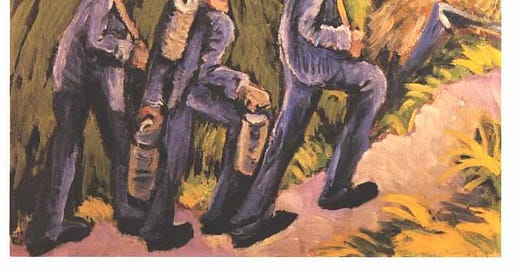In political philosophy and economics, we often apply a reductionist lens to human behavior, mistaking humans for “economic actors,” and interactions for “transactions.” Economic actors are beings who operate in a world of capital; they have needs and desires that can be fulfilled through the generation or exchange of things with capital value (currency, goods, or services). Transaction can be described as an act of mutual taking: two parties with differing needs meet, then leave having each gained and lost something of capital value. Under this economic lens, we can explain, model, and predict all sorts of patterns of behavior. We can even speak of intangible concepts like justice and fairness — in an “unjust” transaction, one party is exploited, having received significantly less than they gained. Aided by such language, we build complex theories of human behavior and governance upon a foundation of economic principles, and use those theories to write policy, assess the rationality of actors, and even judge and govern our own behavior.
But the economic lens, while convenient for neat theorizing, captures only a thin sliver of what an actual human values or experiences in any interaction, even a mostly economic one. Workers will often remain in an underpaid role for years (even an entire career) because they like their coworkers or enjoy the labor, and others will leave a well-paid role because they can’t stand their boss or feel that the work somehow taxes their soul. Restaurant patrons will leave a larger tip (literally pay extra for the same service) because of the way a server’s smile made them feel. We regularly give capital away for free to those less fortunate than ourselves, simply because we care. And as anyone who has ever negotiated for anything knows, when we barter, what matters to us in the end is not truly the amount of value we extracted, but how we feel we and our opponent conducted ourselves with regard to our personal principles and self-image (Did I win? Was I made a fool? Were they mean-spirited? was I the asshole?, etc.).
In recent decades, we have become increasingly willing to acknowledge this incongruity, and have dedicated mountains of research to finding explanations and solutions for this deviant and “unpredictable” human behavior. But from our economic lens, we continue to see each of the above examples of human behavior as a type of minor self-sabotage, a charming but ultimately suboptimal approach to the game of life. Incredibly, there remains a wholly pervasive impulse within economic theory to see the pure economic actor as normative and “rational,” and human deviance from this norm as “irrational” behavior.
This is akin to calling the ocean irrational because it is not always blue like it is in our drawings and paintings. A disparity between a man-made model and the thing it depicts should always be first interpreted as a shortcoming of the model, not a shortcoming of the thing itself. No clear-minded person would argue that the ocean ought to behave more like it does in the paintings, and similarly, no clear-minded person would argue that humans ought to behave more like economic actors, unless it is clear that it would go better for them (as individuals or as a society) if they did so.
Here is the point: if we want to be truly effective strategic actors — to make decisions that give us a shot at “winning the game of life” — we must be careful to first ask ourselves if we know what it means to win. I fear that we have proven quite capable of forgetting ourselves in this regard. Our capitalist milieu quietly guides us to see the world through an economic lens — to equate the attainment of capital value with success and its loss with failure. But to imagine ourselves as economic actors in this way is to unintentionally lobotomize ourselves, reducing ourselves to something less than fully human. Consider: How many of us have sacrificed love or community for economic gain, and yet come to regret it? How many of us have sacrificed economic gain in favor of a person or community that we cared for, and yet counted it as joy? And how many of us can truly say that the happiest times in our lives — the best times — were the times when we hewed closest to the concept of the rational economic actor? For what shall it profit a man, if he shall gain the whole world, and lose his own soul?
Many of us already recognize this — we give to the less fortunate; we tip generously; we keep the pleasant, if underpaid, job. Yet still, our milieu beckons us, and many of us choose every day, in ways large and small, to sacrifice ourselves on the altar of economic “rationality,” ignoring our lived experience (the joy of giving freely, how drained we can feel serving mammon) because we trust the model we invented more than we trust our own selves. We tell ourselves that the unhappiness is somehow false, or else we dream towards our retirement as a sort of economic Valhalla: a glorious final rest earned by throwing ourselves upon the capitalist sword.
Enough of this. We want good lives, not just good endings. Economics matter, yes, but let us stop pretending that we must — or even can — see ourselves or our interactions in purely economic terms. If we want to build good lives, we must see beyond capital — we must integrate economics into a holistic picture of human thriving. The trouble with the economic lens is not that it is wrong, but that it is far too constrictive to serve as a guiding model for our behavior, as individuals or as a society. Certainly, there are ways in which we act irrationally, economically or otherwise; but one such way is by calling ourselves economic actors. The success of a society cannot be understood primarily by its gross domestic product, and the success of an individual cannot be understood primarily by the wealth or capital they own.
The contributist’s orientation towards giving is surprising only to those who have accepted the belief that they are economic actors — the amoral and unfeeling creatures of myth who populate the charts and formulae of economists. By contrast, it is not surprising to the parent (who would give their life for their child), to the altruist (who gives their capital to the needy), to the volunteer or social worker (who gives their time to their cause), or to the patriot (who would give their life for their country). It is not surprising even to the feudal lord, whose rule was legitimated and maintained not by what he owned, but by what and how he gave to his vassals. The claim of the contributist is that the 250-year effort of the economic discipline to sever our behavior from our morals, our emotions, and our well-being — indeed, our very human selves — has not helped us to see more clearly, but has instead made us more blind.
Read next: 7. Who pays for the Baltimore Bridge?





